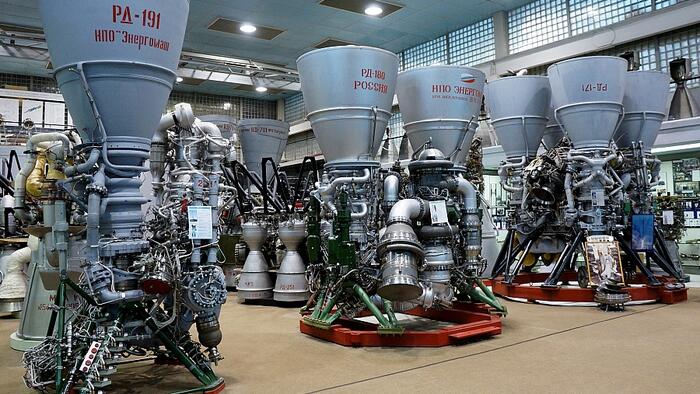Russia Halts Rocket Engine Supply To US As ISS Partnership Threatened
Russia's State Space Corporation Roscosmos halted deliveries of rocket engines to the US following a series of devastating financial sanctions by the US, according to Russian state-owned news agency TASS.
"Today, we have made a decision to halt the deliveries of rocket engines produced by NPO Energomash to the United States. Let me remind you that these deliveries had been quite intensive somewhere since the mid-1990s," Roscosmos Chief Dmitry Rogozin said in an interview with the Rossiya-24 TV on Thursday.
United Launch Alliance (ULA), a joint venture between Boeing and Lockheed Martin, uses Russian RD-180 engines to power Atlas V launch vehicle's main propulsion systems. ULA has been developing a new rocket called Vulcan, which would use American-made engines. Those engines, called BE-4s, are being developed by Jeff Bezos' Blue Origin and are almost ready for testing. ULA CEO Tory Bruno told The Verge, "the very first Vulcan flight, slated to take place this year."
Northrop Grumman Corp. also uses Russian engines on its Antares rocket to lift a spacecraft packed with cargo to the International Space Station (ISS).
Rogozin said Russia had delivered 122 of the RD-180 engines to the US since the 1990s, and about 98 have been used. He said Russia would no longer service the remaining 24 engines, adding that plans to supply the US with an "additional 12 RD-181 engines in 2022-2024" can no longer be fulfilled.
Days ago, Rogozin threatened the ISS partnership, which has been intact for two decades. He said if Russia abandons the 500-ton space station, it will tumble out of low Earth orbit in an "uncontrolled de-orbit." Meanwhile, billionaire Elon Musk tweeted that if the Russians pull out of the ISS, his company, SpaceX, would save the station.
In 2014, lawmakers passed a measure requiring US companies to phase out the Russian-made rocket engines for US ones by the early 2020s. NASA has a few options, but perhaps the most promising and proven has been SpaceX's Falcon 9 rocket, equipped with Raptor engines (all US hardware), that can send both people and cargo to the ISS.
Tyler Durden
Thu, 03/03/2022 - 20:40
http://dlvr.it/SL2hdL

No comments:
Post a Comment